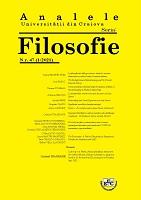MATERIALITY AND LIVED EXPERIENCE IN LATE SARTRE
MATERIALITY AND LIVED EXPERIENCE IN LATE SARTRE
Author(s): Adrián BeneSubject(s): Existentialism, Marxism, Phenomenology
Published by: Editura Universitaria Craiova
Keywords: phenomenology; Marxism; subjectivity; lived experience; materiality; affectivity; intersubjectivity; corporeity; passivity; inertia; Nature; bodiliness; sociality;
Summary/Abstract: This paper discusses subjectivity and its material implications in Jean-Paul Sartre’s Critique of Dialectical Reason and The Family Idiot. Lived experience, ipseity, affectivity, intersubjectivity and desire are closely connected to both subjectivity and corporeity. In his late works Sartre focuses on passivity, inertia and Nature, in accordance with the phenomenological tradition marked by the late Husserl, Heidegger, Eugen Fink, Edith Stein, Jan Patocka, and Maurice Merlau-Ponty. Either in his social ontology or in the existential psychoanalysis of Gustave Flaubert, he emphasizes the role off acticity, the bodily and social existence in our lived experience. The Cartesian tendencies in his Being and Nothingness are obviously passed over, the self-transparency of mind, the epistemological individualism are put into the shade by the impersonal and bodily character of prereflexive state of minds. Lived experience in The Family Idiot is analyzed as an unconscious, vegetative relation to Being, as part of the inert Nature. Similarly, passivity and inertia has a great importance in the Critique of Dialectical Reason. In our social existence, inertia represents materiality in the form of serialization in collectives as basic form of sociality.
Journal: ANALELE UNIVERSITĂȚII DIN CRAIOVA. SERIA FILOSOFIE
- Issue Year: 1/2021
- Issue No: 47
- Page Range: 110-124
- Page Count: 15
- Language: English

